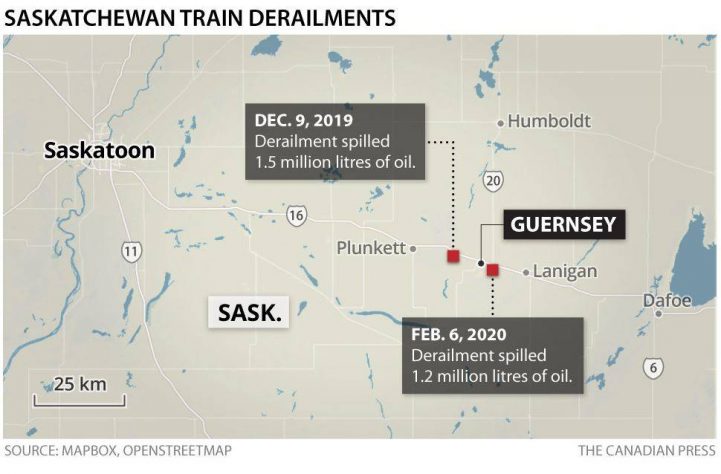The Transportation Safety Board (TSB) of Canada says about 19 cars “were involved in a pool of fire” in a CP train derailment near Guernsey, Sask., on Feb. 6.

The train was travelling 67 kilometres per hour when it experienced an emergency brake application, TSB reported Friday.
Thirty-two of the 104 tanks cars heading from Rosyth, Alta., to Stroud, Okla., left the tracks and several were breached.
Fire broke out among the tank cars involved in the derailment on the west side of the crossing, which took over 24 hours to put out.
TSB said the derailed cars were all DOT 117J100-W tank cars, and its investigation to date has found “no mechanical details observed that could be considered causal.”
“A review of the locomotive event recorder download determined that the train was handled in accordance with regulatory and company requirements,” TSB reported.

Get breaking National news
TSB said the investigation is still in the field phase, and as of Wednesday, about half of the derailed cars had been examined.
Saskatchewan’s Environment Ministry reported 1.2 million litres of crude spilled from the wreckage, however, TSB said it is too soon to determine how much was released into the ground or atmosphere.
Most of the oil spilled was primarily contained to a large ditch between the rail line and Highway 16, TSB reported, adding that it does not appear any waterways were affected.
TSB said it is working with the U.S. National Transportation Safety Board and Trinity, the tank car manufacturer, as there is significant industry interest in documenting the performance of the tank cars.
The derailment forced the evacuation of roughly 85 people from Guernsey to nearby Lanigan while the fire was suppressed. They were allowed to return home the following evening.
Canada’s transportation minister also reacted to the second derailment in as many months in the same area by order lower speed limits for trains hauling large amounts of dangerous goods.
Thirty-three oil tank cars and a hopper car jumped the rails west of Guernsey on Dec. 9, 2019, less than 10 kilometres away from the Feb. 6 derailment.
All trains with 20 or more cars carrying dangerous goods are restricted to speeds of 40 kilometres per hour or less until at least March 8.
The train in the first derailment was travelling at 70 kilometres an hour.
The derailments have also renewed calls for more pipelines, with the reeve of the Rural Municipality of Usborne, Jack Gibney, saying the federal government needs to look more seriously at pipelines to move oil.
















Comments
Want to discuss? Please read our Commenting Policy first.